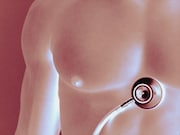Hospitalization/observation, noninvasive stress testing significantly reduced postimplementation
THURSDAY, Feb. 28, 2019 (HealthDay News) — Implementing a history, electrocardiogram, age, risk factors, and troponin (HEART) care pathway can reduce use of hospital care and noninvasive stress testing among patients with suspected acute coronary syndrome (ACS), according to a study published online Feb. 20 in the Annals of Emergency Medicine.
Adam L. Sharp, M.D., from the Kaiser Permanente Los Angeles Medical Center, and colleagues examined the correlation of implementing a HEART care pathway with use of hospital care and noninvasive stress testing among patients evaluated for suspected ACS. Data were included for 65,393 emergency department encounters: 30,522 before and 34,871 after implementation of the HEART care pathway.
The researchers found that 33.5 percent of emergency department chest pain encounters resulted in hospitalization/observation, noninvasive stress testing, or both. Postimplementation, there was a significant decrease in the primary outcomes of hospitalization/observation, noninvasive stress testing, or both (35.5 versus 31.8 percent; odds ratio, 0.984; 95 percent confidence interval, 0.974 to 0.995). After 12-month follow-up, there was an absolute adjusted month-to-month decrease of 4.39 percent, with a continued trend downward. No difference was seen in 30-day mortality or myocardial infarction preimplementation to postimplementation (0.6 to 0.6 percent; odds ratio, 1.02; 95 percent confidence interval, 0.97 to 1.08).
“Our results should influence physicians, administrators, and policymakers to consider a standardized approach to the evaluation and management of patients with chest pain, or other presentations concerning for ACS,” the authors write.
Copyright © 2019 HealthDay. All rights reserved.








